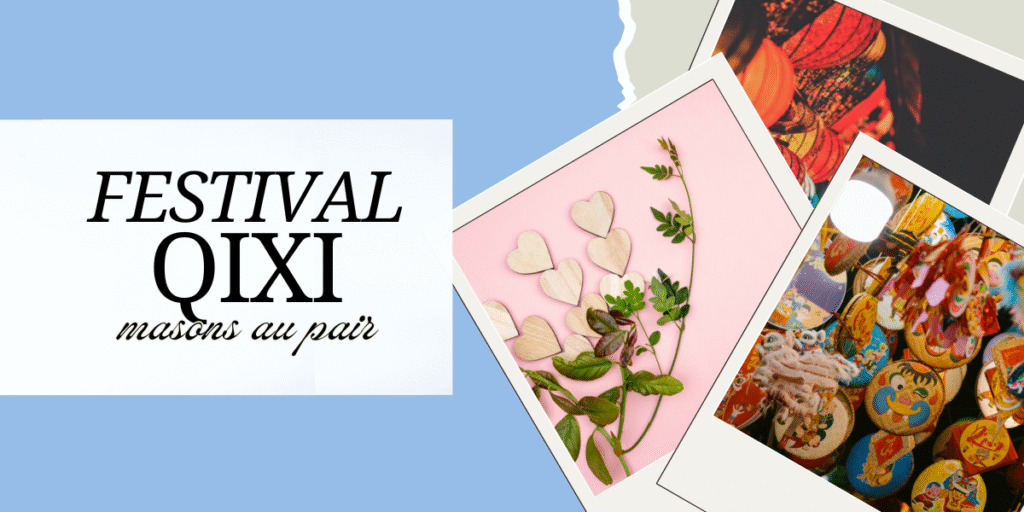The Qixi Festival (七夕节, Qīxì Jié)—often described as the Chinese Valentine’s Day—is one of the most romantic and culturally rich Chinese festivals. Celebrated on the 7th day of the 7th month of the Chinese lunar calendar (falling on August 29, 2025 in the Gregorian calendar), Qixi highlights the harmony between ancient Chinese traditions, folklore, mythology, and modern festivities. Just like the Spring Festival and the Chinese New Year, Qixi connects Chinese people with their ancestors, seasonal rituals, and meaningful values related to love, good fortune, and family unity. For anyone joining an au pair program in China, studying abroad, or exploring Chinese culture, celebrating Qixi is a beautiful way to experience the heart of Chinese customs.
1. The Ancient Origins of the Qixi Festival
The Qixi Festival dates back over 2,000 years to the Han Dynasty and is rooted in the legendary love story of Niulang (the Cowherd) and Zhinu (the Weaver Girl). In ancient Chinese mythology, Zhinu—daughter of the heavenly Emperor—fell in love with the mortal Niulang. The Emperor separated them across the Milky Way, allowing them to meet only once a year on the 7th day of the 7th lunar-month. On that night, a bridge formed by magpies reunites the lovers. This myth has been celebrated through Chinese calligraphy, poems, paintings, and Chinese art across dynasties, symbolizing loyalty, devotion, and perseverance.
2. Rituals, Customs, and Symbolism
Much like the Chinese New Year festival, the Qixi Festival features auspicious rituals and traditional practices passed down for generations. Young women once prayed to Zhinu for skill in weaving, calligraphy, and good fortune. Families prepared offerings such as seasonal fruits, tea, dumplings, and glutinous rice cakes. Many used red paper decorations and Chinese characters symbolizing harmony.
Temples hosted ceremonies where people burned incense, offered flowers, and wrote wishes designed to ward off evil spirits. In southern China, lion dance and dragon dance performances were popular—similar to New Year parades and Spring Festival traditions. These festivities linked everyday life to the heavens, the Chinese-calendar, and the Chinese gods.
3. Qixi Festival Today: Tradition Meets Modernity
Today, the Qixi Festival blends ancient customs with modern festivities. Shopping malls host lantern festival displays, parks organize dragon dance shows, and couples exchange red envelopes or jade jewelry for protection and good luck. Many families prepare traditional desserts such as sesame pastries, red bean cakes, and sweet glutinous rice dumplings—foods that symbolize prosperity and love.
Just like during the Chinese New Year, people light fireworks and firecrackers to chase away bad-luck and invite good fortune. Decorations often include zodiac symbols, depending on the lunar year—for example, the Rabbit, Pig, or Monkey. Qixi has become a symbol of both cultural heritage and modern romance across Mainland China.
4. Experiencing Qixi as an Au Pair or International Student
For au pairs joining a host family in China, celebrating Qixi is a perfect opportunity for intercultural exchange. You may prepare dumplings, decorate the home with lanterns and blessings, or learn calligraphy using traditional Chinese characters. Many families visit temples, attend local lantern festivals, or share stories about ancient Chinese legends and ancestors.
These moments help au pairs improve their Mandarin, understand folk traditions, and connect with Chinese people on a deeper cultural level. For international students, Qixi is a chance to experience something beyond typical tourist activities—it’s a unique immersion into the lunar year celebrations.
5. Foods, Decorations, and Auspicious Symbols
As with other major Chinese New Year celebrations, food and symbolism play an important role during Qixi. Families enjoy lotus seed desserts, glutinous rice cakes, sweet pastries, and symbolic dumplings. Decorations include lanterns, zodiac elements, red paper cuts, and jade charms representing love, wealth, and protection.
Some families give red envelopes, wear new clothes, or light firecrackers—traditions that align closely with Spring Festival rituals. These customs help Qixi fit naturally within the broader framework of the lunar calendar and Chinese New Year culture.
6. Qixi Festival and Its Connection to Other Lunar Celebrations
While Qixi focuses on romance, it shares cultural elements with major Chinese New Year and Spring Festival traditions followed by Chinese people in Mainland China and overseas Chinatown communities. Families rely on the Chinese-calendar, lunar-month cycles, and Gregorian calendar comparisons to plan celebrations.
Foods linked to good fortune—including dumplings and sweet pastries—also appear during Qixi. Decorations include lanterns, zodiac symbols such as the Monkey, and festive red paper cutouts typically seen on the first-day of the Chinese lunar new year.
In earlier dynasties such as the Qing Dynasty, the Emperor sometimes sponsored rituals that combined romance, agriculture, and artistry. In modern times, some areas celebrate Qixi with dragon dance, lion dance shows, or New Year parade-style performances. Firecrackers and lantern displays are used to drive away evil spirits and bad-luck.
Families may bring out ancestors’ portraits, wear jade jewelry, or join public-holiday festivities—even though Qixi itself is not an official holiday in China. These traditions symbolize love, harmony, and protection across the lunar year.
7. FAQ About the Qixi Festival
When is Qixi in 2025?
Qixi is celebrated on August 29, 2025 in the Gregorian calendar.
Is Qixi related to the Chinese New Year?
Yes—many symbols, decorations, and auspicious rituals overlap with Chinese New Year traditions.
What foods are eaten?
Dumplings, glutinous rice cakes, sesame pastries, and red bean desserts.
How do people celebrate today?
Through lantern festivals, dragon dances, fireworks, and symbolic gifts like jade.
How can au pairs join?
Prepare festive dishes, visit temples, and practice calligraphy with your host family.
Conclusion
The Qixi Festival beautifully blends ancient Chinese traditions with modern love celebrations. From dumplings and lanterns to dragon dances, firecrackers, and zodiac symbols, Qixi carries the spirit of the lunar year and the values cherished across generations. For au pairs, students, and travelers, taking part in Qixi is one of the most meaningful ways to experience Chinese culture in an authentic and unforgettable way.

